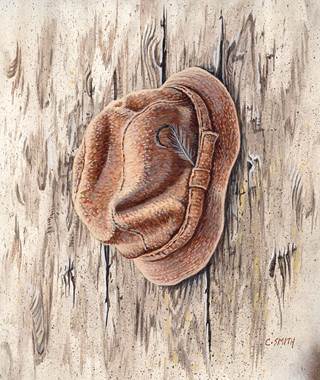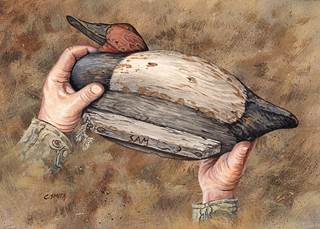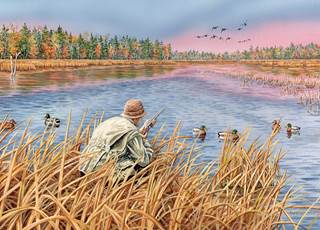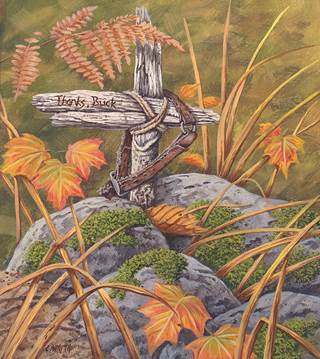The Trapper’s Cabin
Deep in the big woods, the author discovers an abandoned cabin, a waterfowling paradise, and a familiar sense of coming home
Deep in the big woods, the author discovers an abandoned cabin, a waterfowling paradise, and a familiar sense of coming home

Story and Illustrations by Chris Smith
I discovered it the same way I discovered so many other precious spots-while lost amid the impenetrable swampland of Michigan's Upper Peninsula.
I cut class from a local university and drove west two hours to a clear-cut that had held a few grouse the previous fall. Donning hip waders and uncasing a hand-me-down shotgun, I loaded my father's old backpack with as many shells as I felt like carrying, water, survival kit, blanket, and a couple of sandwiches. I slung a mesh bag of six aqua-keel mallard decoys over my shoulder, knowing not having them would be more irritating than lugging them during the upcoming journey. Then I took off down a twisting logging road toward a creek. The map suggested that the creek would lead to a lake, which I imagined as a potential mallard Valhalla. To a college kid living on cafeteria food, a duck dinner would qualify as five-star cuisine.
The creek was right where it should be, but after I had navigated its banks for several hours, there was still no pond in sight. As I continued downstream, the water started spreading delta-like around an array of islands. By late afternoon I was lost. Dad's compass had gotten me out of trouble before, so I took a reading and plodded along the branch with the strongest current.

I spent that first night curled up under an old cedar tree with the chilly October wind partially blocked by a gnarly blowdown. A birch-bark and cedar-limb fire offered nominal warmth and kept the critters in my imagination at bay. No one would worry. I often left for long weekends without warning my roomies, and I went days without reporting to Mom and Dad. Fiercely independent, I used every bit of the long leash they nervously offered.
Waking up hungry and half-congealed but otherwise no worse for wear, I proceeded north. When the sun was highest, I found that the opening I had hoped would be a body of water was in fact an old beaver meadow, evidence that a pond or lake had once been there. In my wildlife classes I had learned the successional stages that such a place goes through on its millennia-long journey to become a beech-maple climax forest. Crossing through the middle of this swampy meadow wouldn't be smart-UP bogs were the Bermuda Triangle of the north. So I skirted the swamp's edges and picked up the creek again. In the next clearing I hit pay dirt-40 acres of open water with a long point sticking out into the middle.
At first, the sight of an old cabin next to the lake was deflating. Had I come all this way only to stumble upon someone else's hunting camp? After closer inspection, I found that it was abandoned-and had been for years, by the looks of it. There was a broken window, cracked by the sagging frame, an old bee's nest under one eve, and bracken ferns growing up through the wooden steps. The top of a nearby white pine had broken off and caved in a small corner of the roof.
Plenty of black bears roamed those swamps, so I approached the place with enough caution that when a raccoon bolted from the open front door, my yell was stifled by nervous relief. I entered slowly. The air smelled fresh rather than musty. Ventilation was courtesy of the open door and a hole in the roof. In the far corner was an old bunk where a mouse-shredded mattress clung to a few rusty springs. Against an adjacent wall was a small kitchen that offered a view of the lake. Behind me was a solid-looking wood stove. The chimney appeared in decent shape, and I envisioned a roaring fire to warm my frozen digits.

Several Fur-Fish-Game magazines, similar to those I'd seen in Dad's collection as a kid, adorned an old table. An ancient canvasback decoy was lying on the wood floor. I immediately snatched it up as a collector would a dust-covered Purdey shotgun at a garage sale. Carefully appraising the well-used block, I noticed a couple of shot holes-sure signs that whoever had lived there had been a duck hunter. By the way the decoy sat, I imagined the owner must have loved waterfowling as much as I was learning to love it. Beneath the weighted keel, burned into the cedar block, was one simple word: Sam.
In another corner, propped against a worn, hickory-handled ax, rested two traps-the same types of conibears that a professor had taught me were perfect for taking beavers. The owner of this cabin must have been a true sportsman-a trapper and hunter who lived off the land, as so many aspired to do yet rarely achieved. But what had driven him to seek such solitude? Family? Work? Perhaps Sam served in World War II and simply desired to live out his days in peace.
Since my own grandfather was a B-24 waist gunner who flew missions over Germany, I chose to believe that last option-a war hero who said good-bye to the world to scratch out his remaining years from this beautiful country on his own terms. Or maybe it was because I could see myself doing the same thing someday.
A tweed hat hung from a nail near the door, adorned with the remnants of a curly mallard tail feather. Dusting it off, I smiled when it fit perfectly. A familiar feeling crept over me, but it was one that I'd never noticed away from home. That was it. I felt . . . home.
Stepping outside and into the October sun warmed me briefly. With at least a day's walk back to the truck, I grinned with anticipation at the coming night in my new cabin. But having forgotten about ducks while under the spell of this hidden treasure, I was suddenly hungry. A duck dinner would be a fitting end to such a grand day. Snugging the brim of the old hat lower, I set off for the end of the point.
The remaining two hours of daylight offered plenty of time. Normally, ducks and maybe a few geese would use such a remote pond from midmorning to early afternoon to loaf. But my discovery of the pond's strip of wild rice was almost as exciting as the cabin. It meant duck food and, I hoped, some action. In feeding habitats like this, the first and last hours of the day were usually the best.
While similar wild rice lakes littered the Upper Peninsula, they usually attracted the attention of duck hunters as well as ducks. Scanning the lake with a small pair of binoculars, I was pleased to see no blinds or flipped-over canoes along the shore. Other than Sam, I doubted anyone had been there before, especially to hunt.
Such places were magnets for certain species. Wood ducks and mallards, of course, along with ringnecks and maybe a few bluebills mixed in. I'd never shot a ringneck, but I had shot at a few of those speed demons. Maybe this was the day. Regardless of what flew over, I knew that ducks that were eating wild rice were likely to be at least better than average in taste. Though truth be told, since devouring my last sandwich at noon, I'd have happily taken a couple of mergansers.
With all that had happened the last two days, it felt strange to stand on the point and finally go hunting. I settled down to the business of setting the decoys and figuring out how I would retrieve them once I had thrown them from shore. That water looked mighty black and deep, surely over my hip boots. Luckily, one decoy carried a 12-foot anchor cord that could serve as a lasso for the other lines at pickup time, provided they weren't too far away. Six blocks wouldn't do the job as well as a dozen or more would, but they were all I had, so I'd have to make them come to life.
By running a line under a heavy, submerged log, I was able to fashion a simple jerk string. My father loved a good jerk string for motion. "Ducks aren't sedentary," he'd say. But Dad was also old-fashioned, and he didn't like anything that ran on batteries. "I go to the marsh to get away from the noise, not to bring it with me," he often said. I was a lot like that too, and so far seclusion was my favorite part about this little paradise.

With enough bog grass for me to hunker down in, and a fair setup, the waiting game commenced. I can still remember the welcome sound of those fighter-jet ringnecks as they dive-bombed the lake not 10 minutes later. Once, twice, three times they circled at what seemed a hundred miles per hour. Wishing to conserve my few precious shells, I held my fire even though on two of the passes the birds were well within range. On the fourth flyby, impatience and hunger got the best of me.
Pick one bird and stick with it, I told myself. But at the fateful moment, I fired, then fired again at all of them. Dad would have scolded me for flock shooting, or at least laughed. My heart sank when nothing fell from the departing flock, until a single drake slanted hard 75 yards away and went down in the marsh. Never had I wanted a duck so badly, and I galloped to it faster than a retriever. It was my first ringneck. It should be called a "ringbill," I thought as I marveled at the white rings around the base and tip of the bill.
Proudly hustling back to my weedy blind, careful not to ruffle the bird's feathers, I wondered if the day could get any better. It did. After I had saluted two more flocks of divers with nothing to show but the fine smell of spent duck loads, a pair of mallards glided down nearly on top of me. A few mediocre quacks from the call and a handful of tugs on the cord worked like magic, and one of the birds fell on the second shot. It splashed down in six inches of grassy water not far away, and I had a pending meal fit for a king.
Practically giddy, I hauled my six decoys and two prized ducks back to the cabin in the glowing sunset. I was thankful that it didn't look like rain. The hole in the cabin's roof and window were obvious leaks, but surely there were others.
Setting my load down near the door, I took a quick but careful stroll around the cabin's exterior. As I crept along in the gathering darkness, I noticed that the dwelling was more structurally sound than I had originally thought. A couple of old trails led in different directions. Maybe they were walking trails. Maybe one led to a cache where Sam had kept food safe from the critters. Would good fortune lead me to a boat?

My thoughts stumbled as much as my feet, and I eventually tripped over a grave. With a lump in my throat, I froze. Sam? Not possible. Besides, it was too small. Then my flashlight caught the glint of a buckle from a dog's collar. It was Sam's dog, of course. Kneeling down, almost reverently, I inspected the grave site, and then the small driftwood cross, tied together with twine, where the collar hung. Burned into the horizontal piece were two words: Thanks, Buck.
A wave of emotions washed over me. With no one around, I didn't wipe away the few tears that trickled down my cheeks. I just knelt there, sad and confused. I'd never met this person nor this dog, yet I felt connected. Tears flowed more freely when I remembered my family dog, Jess, an English setter we owned when I was growing up. Mom told me it was natural to cry, especially for bird dogs at the end of their days afield.
With enough secrets to unravel, the adventurous part of me that had found this place roared back to life. My wet eyes sparkled at the thought of dinner, the coming night, a roaring fire in the cabin with a hole in its roof, and tomorrow.
Entering through the front door, I paused, placed the ducks on the table, and inhaled deeply. I was home.
Ducks Unlimited uses cookies to enhance your browsing experience, optimize site functionality, analyze traffic, and deliver personalized advertising through third parties. By continuing to use this site, you agree to our use of cookies. View Privacy Policy